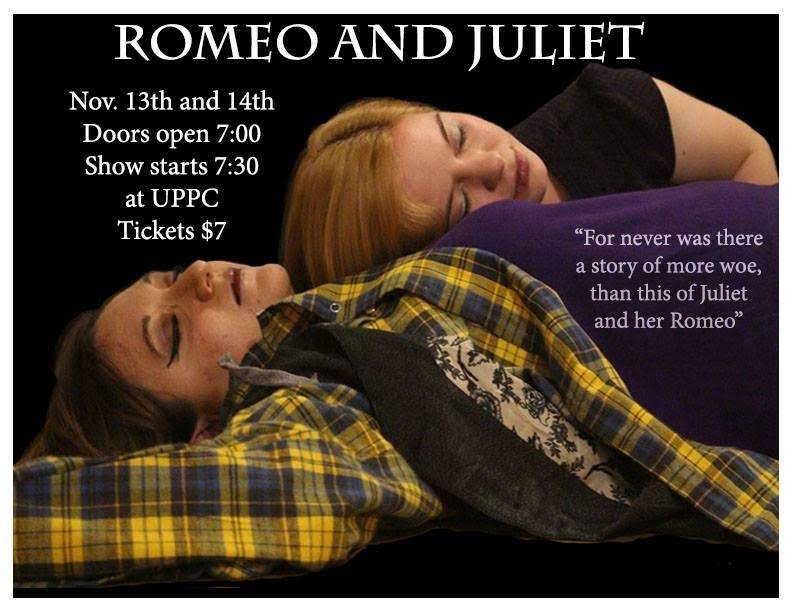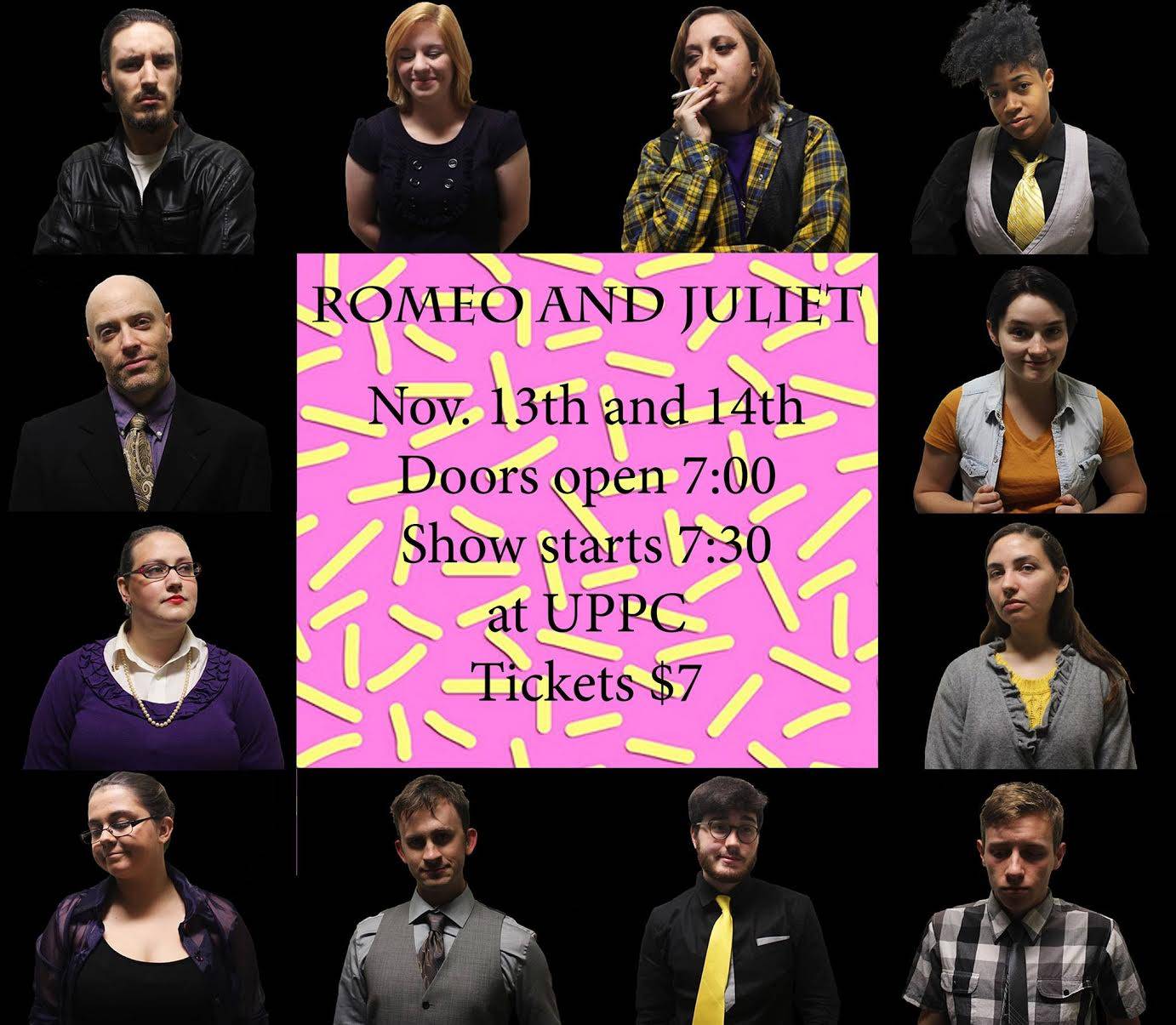All of us have had an encounter with Shakespeare’s Romeo and Juliet at one point or another. Whether it be in writing, on stage, or on a screen, Romeo and Juliet is one of Shakespeare’s most frequently performed plays. But amid the countless adaptations, U of I’s What You Will Shakespeare Company has managed to stand out with their unique twists on the classic. If the play is near and dear to your heart, fear not; “We really wanted the play to have a similar feel to the original play,” says assistant director Clayton Gentilcore. If you look upon it disdainfully as the play you were forced to read in middle school, high school, and college, don’t roll your eyes just yet. Featuring a female Romeo, queer Montagues, and a 1990’s backdrop, WYW Shakespeare Company’s distinctive take on the classic is guaranteed to keep you intrigued.
Below, I got to speak with directors Delilah Hansen and Clayton Gentilcore and Kim Gasiciel, who plays Romeo, about the production.
—
 Smile Politely: Why did the directors decide to make Romeo a woman and her parents queer?
Smile Politely: Why did the directors decide to make Romeo a woman and her parents queer?
Delilah Hansen: My original concept was to focus on the feud, so I decided to make Romeo’s parents queer since they’re underrepresented in the text and the Capulets are very obviously conservative in the text. I thought it would be an interesting interpretation [making Romeo female] since Romeo’s lines focus on masculinity. It would take those lines and study them with a different sort of nuance that shows the struggle many queer individuals feel with gender norms.
SP: What about choosing the play to be set in the 90s?
DH: There’s just something about the angst of the play that seemed perfect for the 90s to me. One part of my concept when proposing the show was to end the first act with Hurt by Nine Inch Nails and the second with Johnny Cash’s cover. The Nine Inch Nails version is angstier, cruder, more naive and overall a younger sort of pain – like a lot of the pain that is seen in the first act. Johnny Cash’s version has a numbness to it; it’s a much older sort of pain, one that matches what the parents feel. Additionally, Grunge and the Riot Grrrl movement are other big parts of this production – a sort of contrast between liberal (Montague) and conservative (Capulet) mindsets.

SP: Considering the modifications you’ve made, how much direction did the original play provide, and how much stemmed from your own agency?
DH: It’s a really fine line between the direction the play provides and what stems from myself because when reading anything the only way you can perceive it is the way you personally do – and this is just how I envisioned the play while reading it. I noticed a lot of focus on different kinds of love, how it can be painful and beautiful. I also saw a lot of commentary on classism which inspired a couple of characters’, such as Friar Lawrence and Tybalt’s, backstories.
Clayton Gentilcore: We really wanted the play to have a similar feel to the original play. One aspect that we focused on is the feud that happens throughout the entire play. The feud between the two families is always present in the background of the show, whether it be people risking their lives for their own families or subtly wearing specific colors of clothing.
SP: And Kim, how much of your character and performance did you base off the original play, and how much came from your own creativity?
Kim Gasiciel: I am a firm believer that all of an actor’s character choices should be based in some way on the text. The great thing about Shakespeare is that the poetry lends itself to multiple interpretations. Because we’re using the 90’s grunge and queer movements as a framework for interpreting the text, a lot of what I do is already outlined in the play already, just with that 90’s Riot Grrrl attitude. The big difference, of course, is that I am a lady and that the Montagues are a queer couple as well.
SP: What was the most challenging part of bringing your character to life? Your favorite part?
KG: Romeo is one of the most famous characters in all of literature, and it’s terrifying to go into this performance knowing that people will have certain expectations on how Romeo should be played, especially because I’m a woman and the character traditionally is not. It’s also incredibly easy to make Romeo mopey and boring, and I’m constantly afraid of giving a stereotypical performance.
My favorite part of bringing the character to life has definitely been exploring the character’s textual motivations. So much of what the characters do and say in this play can seem silly from a third-party standpoint, but most of what they feel are things we’ve experienced on some level. Pretty much everybody has experienced unrequited love at some point, and people can do crazy things for those that they love.
 SP: To you, what is the funniest or most tragic part of the play?
SP: To you, what is the funniest or most tragic part of the play?
CG: The most tragic part of the play to me is Act 3, Scene 1, which concludes the first half of the production. The show that was originally a rom-com gets thrown into a shredder, and the pieces are buried. When the pieces are dug up and somehow put back together, they form a depressing drama. It’s a great contrast between the two parts of our show.
KG: I am definitely biased, but the last scene of the play is absolutely heartbreaking. Nobody in the play deserves to die, but hate and desperation drive the characters to make terrible choices. As somebody who believes wholeheartedly in love being worth everything that a person can give, it’s painful to see that taken away from Romeo and Juliet as a result of their parents’ hatred.
DH: In my opinion the most tragic part of the play is not the fact that Romeo and Juliet die, but that they hurt so many people in the pursuit of such a fleeting moment.
I don’t really have a funniest part in mind, but I do have a scene I really enjoy. I love how Act 1, scene 5 turned out – this is the party scene. It’s pretty much all action and I just think it’s beautiful and depicts a trio of teenagers crashing a family party pretty well. The music fits, everyone looks fantastic, and there are masks – what more can you ask for in a party?
—
Romeo and Juliet will have performances on November 13 and 14 at 7:30 p.m. at University Place Christian Church, located on the corner of Wright and Springfield. Doors open at 7 p.m. Tickets are $7 and can be purchased at the door.








